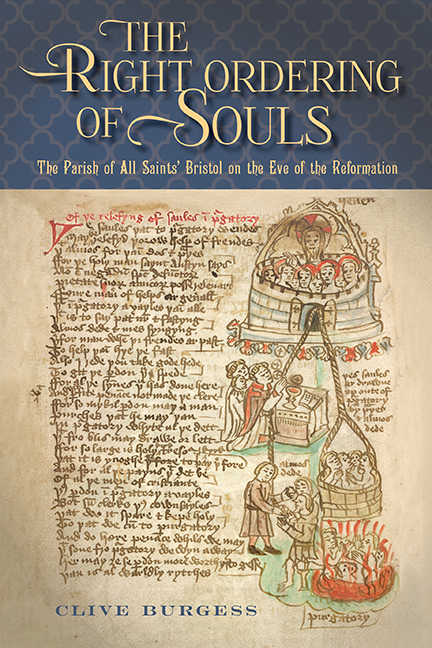Book contents
- Frontmatter
- Dedication
- Contents
- List of illustrations
- Acknowledgements
- Miscellaneous Frontmatter
- Abbreviations
- Notes
- map
- Part I For the increase of the divine service
- 1 ‘God is in none land so well served’: Placing the late medieval English parish
- Part II All Saints’, Bristol, and its parishioners
- Part III Commemorating the dead
- Part IV Leaders and administrators
- Part V Ordering the parish
- Appendices
- Bibliography
- Glossary
- Index
- Miscellaneous Endmatter
1 - ‘God is in none land so well served’: Placing the late medieval English parish
from Part I - For the increase of the divine service
Published online by Cambridge University Press: 05 May 2018
- Frontmatter
- Dedication
- Contents
- List of illustrations
- Acknowledgements
- Miscellaneous Frontmatter
- Abbreviations
- Notes
- map
- Part I For the increase of the divine service
- 1 ‘God is in none land so well served’: Placing the late medieval English parish
- Part II All Saints’, Bristol, and its parishioners
- Part III Commemorating the dead
- Part IV Leaders and administrators
- Part V Ordering the parish
- Appendices
- Bibliography
- Glossary
- Index
- Miscellaneous Endmatter
Summary
IN the century before the Reformation, many English parishes witnessed far-reaching change; this study offers a detailed exploration of one ongoing transformation, and focuses on a well-documented urban example to draw attention to its parishioners’ unstinting financial and managerial investment. But by way of introduction, and to provide a context for the enterprise unfolding throughout England, the question of motive demands attention: why was the laity inclined to be so generous? Attempts to understand quite what sustained such an extraordinary outlay, both in terms of means and of effort, lead us unerringly back towards ‘the establishment’ and, more precisely, the objectives both of the Church and of successive governments acting either separately or in collusion. We need first to consider some of the spiritual principles that underpinned Christian behaviour, investigating the manner in which these adapted during the period in question; we may then reflect on the reasons why the authorities saw fit to cultivate such a vigorous response in the localities, shaping public worship to address a variety of political and social needs.
The Right Ordering of Souls: Penitential developments and pastoral responses
In any assessment of the spiritual imperatives that determined belief and behaviour during this period, the Fourth Lateran Council's decree Omnis utriusque sexus, promulgated in 1215, provides a good starting point. Convened by Pope Innocent III, the Lateran Council saw more than one thousand prelates from every part of Christendom gathering in Rome: it set down a template for Christianity that would, in essence, prevail until the Council of Trent. As Alexander Murray comments, its core thinking is revealed ‘in one short phrase in canon no. 27: Ars artium regimen animarum – the right ordering of souls is the art of arts’: the Council's intention was ‘to bring the divine down to earth’ by re-directing the efforts of the Church so that it should function more effectively in assisting all the faithful. In defining aspects of the faith, the Council issued canons against heresy and superstition, and set standards concerning clerical selection, education and discipline. It also imposed obligations on the laity – notably, that ‘every Christian of either sex’ should make a confession at least once annually.
- Type
- Chapter
- Information
- 'The Right Ordering of Souls'The Parish of All Saints’ Bristol on the Eve of the Reformation, pp. 5 - 56Publisher: Boydell & BrewerPrint publication year: 2018



